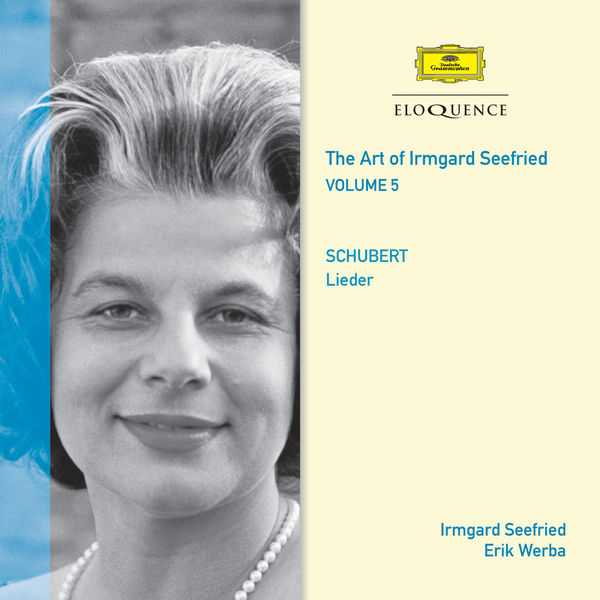
Composer: Franz Peter Schubert
Performer: Irmgard Seefried, Erik Werba
Format: FLAC (tracks)
Label: Deutsche Grammophon
Catalogue: ELQ4807231
Release: 2014
Size: 292 MB
Recovery: +3%
Scan: cover
01. Im Frühling, D882
02. Litanei auf das Fest Allerseelen, D343
03. Auf dem Wasser zu singen, D774
04. Ave Maria, D839
05. Die Liebe hat gelogen D751 (Platen)
06. Fischerweise, D881 (Schlechta)
07. Die junge Nonne, D828
08. Nur wer die Sehnsucht kennt, D.877 No. 4 (Mignons Gesang, 4th ver sion)
09. Heiss mich nicht reden, D877 / 2
10. So lasst mich scheinen, D877 No. 3
11. Kennst du das Land (Mignons Gesang), D321
12. Wiegenlied, D498
13. Seligkeit D433 (Holty)
14. Lachen und Weinen, D777
15. Das Lied im Grünen, D917
16. Die Forelle, D550
17. Liebhaber in allen Gestalten, D558
18. An die Musik, D.547 (Op. 88 / 4)
19. Der König in Thule, D367
20. Gretchen am Spinnrade, D118
21. Gretchen im Zwinger D564
22. Szene aus Faust D126 (Goethe)
After Irmgard Seefried’s death in 1988, her contemporary Elisabeth Schwarzkopf – never one to dish out compliments lightly – commented: ‘All of us envied her, because what we had to achieve laboriously worked for her so naturally and as a matter of course, because she knew how to sing from the heart’.
Freshness, spontaneity, natural warmth of feeling, allied to a voice of gleaming beauty and a delightful stage presence: these were the hallmarks of a much-loved soprano who for three decades charmed and moved audiences in the theatre and concert hall, her face as expressive as her voice. As John Steane memorably put it in Gramophone, ‘it was as though she wore her own spotlight’.
Born in the Swabian town of Köngetried in 1919, Seefried was ‘discovered’, aged twenty, by Herbert von Karajan in Aachen, where she made her operatic debut as the Priestess in Aida. In 1943 she sang Eva in Die Meistersinger for the Wiener Staatsoper, initiating an association that lasted until 1976. It was in Strauss and Mozart that Seefried was most admired.
Issued over eleven single-disc volumes, Deutsche Grammophon / Eloquence pays tribute to Irmgard Seefried, bringing back to circulation several recordings that have never previously been issued on CD. The music ranges through opera and oratorio, with an especially generous offering of art song from a range of composers, including Schubert, Schumann, Wolf, Hindemith and Egk. The notes for the series have been written by that leading connoisseur of the voice, Richard Wigmore.
Like few other operatic sopranos of her generation (Schwarzkopf an obvious exception), Seefried was equally cherished as a Lieder singer: for her incomparably vital stage personality, and the charm, immediacy and imaginative strength of her interpretations. As John Steane put it, recalling her many appearances at London’s Wigmore Hall, ‘when she was on the concert platform it was impossible to look down at your program’.
Something of Seefried’s famed animation comes across even on disc, when she must perforce sing for a ‘blind’ audience. Her vernal timbre, unaffected charm and liveliness of response were, of course, ideal for Schubert. And as these recordings with Erik Werba (her pianist of choice from the mid-1950s) recorded in stereo reveal, she ventured well beyond the core of Schubertian favourites to embrace such rarities (even today) as ‘Die Liebe hat gelogen’ and the quasi-operatic ‘Szene aus Faust’.